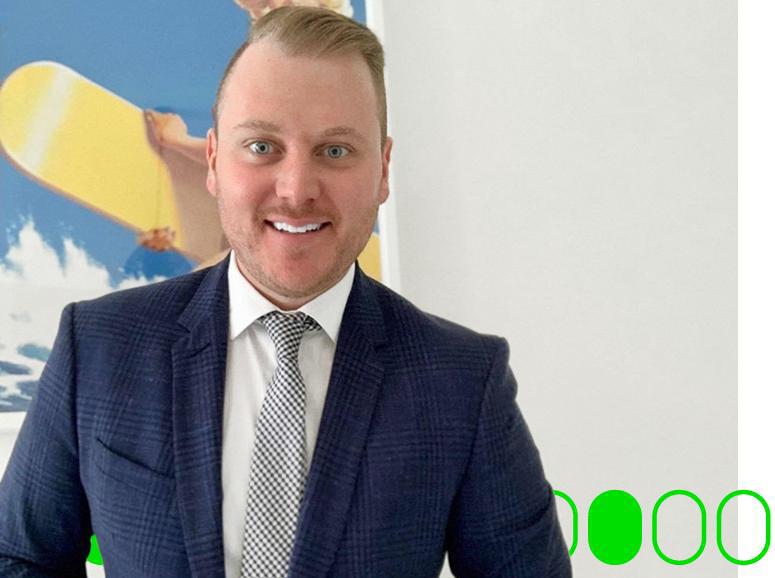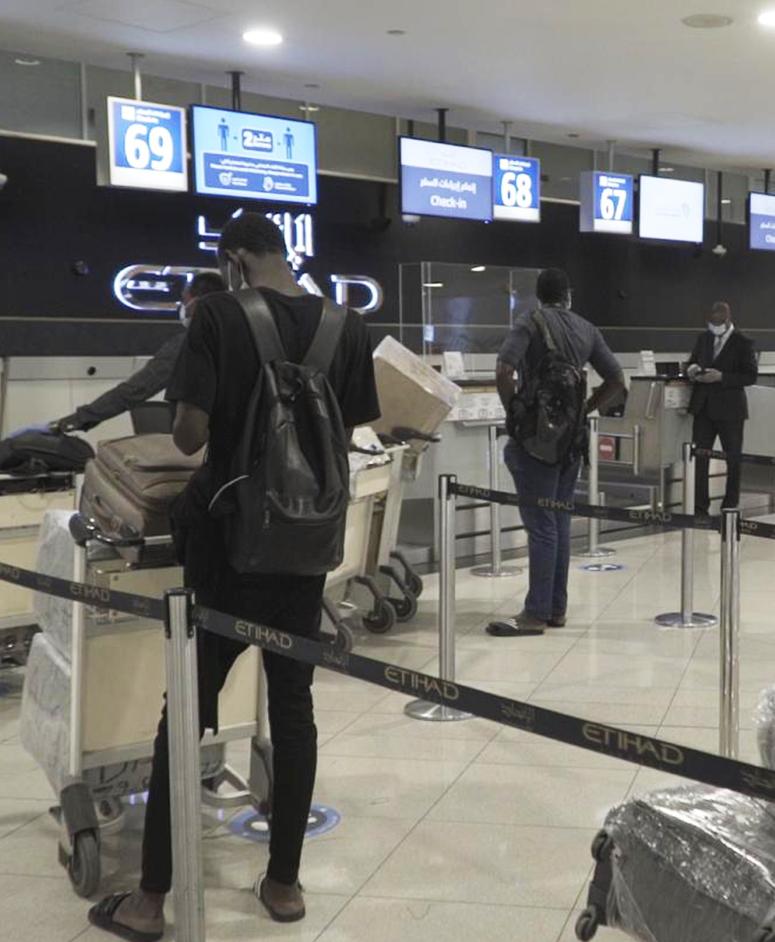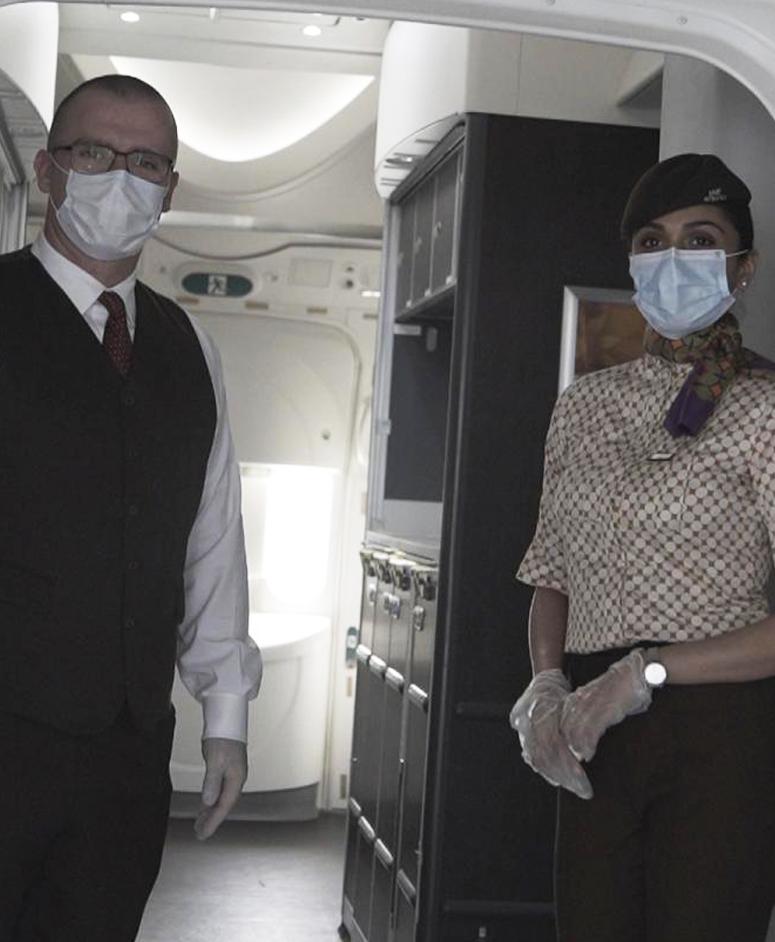In Conversation With: Daniel Hards, Etihad Airways

When travellers return to travelling post-COVID19, health and safety will be top of mind. Airlines around the world are working on new solutions and technology to provide peace of mind for travellers, in particular business travellers.
FCM’s Lindsay Porter, Strategic Partnerships Manager sat down with Etihad’s Manager Ground Service Policy, Daniel Hards to chat about how Etihad is responding to the challenges of COVID-19, and how technology will play a part in the future airport experience for passengers.
Daniel Hards
What is your current role and areas of responsibility? What are some of the airports you oversee globally?
I currently lead the design, develop, document & train phases of all things related to guest management at airports – in over 75 destinations globally. We are responsible for operationalising the Product & Guest Experience strategy and set the framework for this to be delivered.
At Etihad, we always have a lens on Customer Satisfaction. We dedicate a significant amount of time to understanding and analysing customer insights as they relate to the airport journey, and are continuously evolving our processes to drive results in the vastly diverse markets we serve.
My role is fantastically diverse. I start my day here in Abu Dhabi, and have inputs from our 24/7 Hub Operation, as well as the previous day in the US, and Europe who are a few hours behind. By then, our Asia Pacific team are already well into their work day and we have our MENA and Indian Sub-continent teams online at a similar time.
On any given day, I could be looking at operational process for New York JFK, London Heathrow, Paris CDG, Sydney, Singapore, Mumbai or Cairo – just to name a few.
When we were travelling pre COVID-19, what would be some of the experiences we would have that you would manage or oversee?
If you think about an airport terminal where Etihad flies, my team and I look after the processes that you see our ground teams deliver across our various guest touchpoints.
This includes training, policy and regulatory compliance, and covers everything across the check-in & boarding experience including our Special Assistance services and managing many of our bespoke products, for example, an upgrade to The Residence, our private three-room suite in the sky!
With the onset of COVID-19, how did you initially respond?
Initially, our response was geared towards the rapid closure of borders and introduction of new travel restrictions. We had guests commencing travel, or already in-flight to all four corners of the world with sometimes immediate notification of new restrictions. We had to act fast and with compassion to handle this.
We pivoted quickly to ensure we kept our team and guests safe, implementing PPE requirements, updating aircraft seat maps to socially distance and define a ‘quarantine zone’ on each flight. We have also implemented thermal passenger screening for all Etihad flights.
In terms of support, our airports all have access to a 24/7 medical assistance service, where they can be immediately connected with a health professional to discuss any observed or reported signs/symptoms of travelers. This independent review supports airport staff to obtain a real-time professional recommendation on fitness-to-travel.
In terms of our team, at our Hub in Abu Dhabi, airport staff are being rostered in swing patterns and coming to each duty from quarantined accommodation in designated hotels and company accommodation facilities. These teams undergo regular COVID tests to ensure we identify any risks and can replace the swing team with the next pattern immediately, if required.
What has surprised you the most about COVID-19?
We have been on an extensive journey to document all of our actions across the airline, when it comes to preventing the spread of COVID-19.
What has surprised me, is just how clean air travel has always been, for example; the effectiveness of the aircraft filtration systems that have always been in use.
We use HEPA air filters which capture 99.97% of airborne microbes. Our airflow systems mean that on average, air is refreshed on board every 3 minutes, to hospital grade quality. To the same effect, our cabin cleaners use a disinfectant product that is effective for up to 10 days!

What are some of the changes you have implemented to the passenger experience, to ensure health and safety of travelers and staff within your airports?
PPE requirements for staff and a recommendation for PPE by travellers were among the first. Thermal Screening followed quickly, so we could build confidence around the health of those boarding our flights.
In terms of the safe passenger experience, we have new health questions asked at check-in for all guests, and have updated our boarding and disembarkation procedures to keep a safe social distance.
We’re asking guests to scan their own boarding passes and hold up their passports for verification and use of a face mask at all times during travel. We have signage in our airports to help guests see the recommendations for staying safe. We’re working with airport authorities to implement the Etihad standards for COVID prevention, such as installing plexi-glass screens at key touchpoints.
Of course, sanitisation is key – we have worked with our cleaning providers to maintain the highest standards with regards to aircraft cabin disinfection. For example, if we are to suspect a possible contamination case onboard an aircraft, the entire seat cover will be removed, incinerated and replaced with a new one. We are sanitising our wheelchairs after use, and increasing our oversight for all of these cleanliness activities.

Do you have any predictions for what some of the primary changes will be in the airport experience when travel returns?
Without a doubt, we can expect PPE, social distancing in queues and main touchpoints, temperature screening, health questionnaires and declarations.
I think we will also see a shift in the airline to customer dynamics, before you travel and throughout the journey. As an example, we’re sending a tailored message to guests on every flight via email, before they travel. This message has information about what measures we’ve taken, and specific information on any regulatory requirements for either the departure or arrival country.
We expect the travelling public will have questions, so we are working to ensure our frontline teams understand all of the measures we have in place and can answer accordingly.
We are also looking at some basics around how to communicate effectively behind a face mask. Something as simple as, using eye contact and body language to guide a friendly welcome and actions that are safe. We see tendencies for guests to ‘hand over’ a boarding pass, for example. In the new world, we are happy to help – but for hygiene, we may ask you to simply show us. This is not at all our team being dismissive, but thinking of the bigger health picture and passenger safety.
What have you identified as some of the key risks for travellers and staff?
As we see the industry respond to the key risks in regards to hygiene and sanitisation, the remaining risks are specific for those in high risk groups, who disregard recommendations or do not take their own measures to responsibly protect themselves or others.
For me, I have a detailed understanding of the measures in place to mitigate risk, and I think it’s important to note that my confidence to travel, personally, has not changed. Having said that, would I wear a face covering now when moving through high-traffic areas of the journey? Yes, I would.
On a wider lens, when travelling during a global pandemic, it is important to consider the access to health resources and the ability to cross borders without restriction. Knowing what your travel insurance policy does and does not cover is important.
Travellers now need to take the time to understand and follow the recommendations to stay safe, and respect that many processes they are used to, will change.
What are the key areas of focus for you currently, and how has this changed in response to COVID-19?
The focus is two-fold, on closely managing the requirements for the flying schedule which we are operating now, with cargo, charter and passenger repatriations; similarly, on the safe restart of operations. We are refining our procedures and precautions so that we are ready. There is of course the ever-changing demand for compliance to regulatory changes. At the moment, these are evolving daily and drive a significant amount of work to ensure we are compliant.
How much will technology play a part in the future airport experience for your customers?
Technology will undoubtedly continue to transform the experience.
Initially, think QR codes to read a menu or replace other instructions. At Etihad, we are working on a solution now to integrate a health screen, including a temperature check, and check of vital signs through infrared and thermal imaging capability – before you use a bag drop device.
Answering the health questions will be as simple as a tilt of the head in either direction, or signalling your hand one way or the other – so the transaction remains completely touchless.
I see that biometric validation will continue to evolve and assist in the touchless journey.
For travellers who might be concerned about travelling again when restrictions ease and borders re-open, what do you think will put their minds at ease?
Awareness of the precautions taken by the airport operator, the airline of choice and the self-imposed precautions that can be taken is important.
There is so much in the media around the dangers and at this point, we are acutely aware and on high-alert. This shouldn’t discourage people from a little bit of specific research on what has been done at each point in the journey they are about to take. You will find many resources on airport and government travel websites, along with the information from the airline itself. Jump over to our website to see what we’re doing.